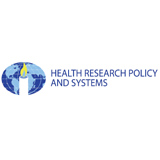
Background: Using measles and tuberculosis as case examples, with a systems thinking approach, this study examines the human advice-seeking behavior of primary health care (PHC) physicians in a rural district of Pakistan. This study analyzes the degree to which the existing PHC system supports their access to human advice, and explores in what ways this system might be strengthened to better meet provider needs.
Methods: The study was conducted in a rural district of Pakistan and, with a cross-sectional study design, it employed a range of research methods, namely extensive document review for mapping existing information systems, social network analysis of physicians’ advice-seeking practice, and key stakeholder interviews for an in-depth understanding of the experience of physicians. Illustrations were prepared for information flow mechanism, sociographs were generated for analyzing social networks, and content analysis of qualitative findings was carried out for in-depth interpretation of underlying meanings.
Results: The findings of this study reveal that non-availability of competent supervisory staff, a focus on improving performance indicators rather than clinical guidance, and a lack of a functional referral system have collectively created an environment in which PHC physicians have developed their own strategies to overcome these constraints. They are well aware of the human expertise available within and outside the district. However, their advice-seeking behavior was dependent upon existence of informal social interaction with the senior specialists. Despite the limitations of the system, the physicians proactively used their professional linkages to seek advice and also to refer patients to the referral center based on their experience and the facilities that they trusted.